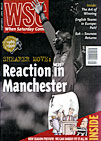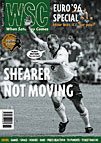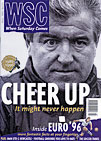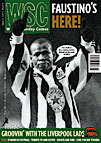 Dear WSC
Dear WSC
Steve Hughes’ thoughts on curved roof design (Letters, WSC No 114) are so far wide of the mark as to be laughable. The curved roof at Huddersfield is anything but a fashion statement. Instead, it stems from the architects taking a fresh look at stadium design, and seeking to improve the view for the average punter. To put it simply, the roof is curved because the stands are curved. Before anyone replies attacking the new and dangerous fashion of ‘curved stands’, may I point out the reason for this design. The curved stands mean there are no seats in the far top corners of the ground, as there are no corners! This makes it impossible to sit further than 90 yards from the centre circle and thus gives the paying customer a better view of the game. The curved roof keeps the spectators dry without needing any of those irritating posts that tend to block the view of the game. If Steve Hughes really wants to see a football ground that looks like a supermarket, I suggest he looks at another of Britain’s new stadiums, not Huddersfield. Wolves, Middlesbrough, Chester, Scunthorpe and Walsall have all built grounds in Sainsbury’s style. They may be aesthetically pleasing to Mr Hughes, but they aren’t much good for watching football in.
Robin Stewart, Huddersfield
Search: 'World Cup 1982'
Stories
 Germany's victory at Euro '96 produced an unforseen reaction among some of those watching it at home, as Uli Hesse-Lichtenberger reports
Germany's victory at Euro '96 produced an unforseen reaction among some of those watching it at home, as Uli Hesse-Lichtenberger reports
I knew he was going to miss. The set-up was too perfect for him not to miss: An evening at Wembley with the tournament on the line. He had had one of his half-baked games, had received a yellow card that would bar him from the final – and the he was the captain. Perfect. There was no question Möller would live up to his image of the underachieving genius cracking under pressure.
 Cris Freddi looks back at the highs and lows of the European Championship. Guess which category England appear most in
Cris Freddi looks back at the highs and lows of the European Championship. Guess which category England appear most in
1960: USSR 2, Yugoslavia 1 aet (Paris)
The Soviets were a little lucky to reach the last four, the Fascist government having withdrawn Spain from the quarter-final, but once there they were generally in charge, conceding only one goal in the two matches while wearing down the Czechs (3-0) and the skilful Yugoslavs, their big centre-forward Viktor Pondelnik scoring the winner in extra time. Yugoslavia consoled themselves by winning the Olympic title later that year. To no-one’s surprise, then or now, none of the British countries entered.
Player of the tournament: Lev Yashin, prominent in match reports and beaten only once by a deflection from his captain Igor Netto.
Cock-up of the tournament: Anything by the French defence. Leading 4-2 with a quarter of an hour to go in the semi-final with Yugoslavia, they concede three in three minutes.
 Dear WSC,
Dear WSC,
While I was expecting WSC to cover the issue of the proposed relocation of Wimbledon FC, I was disappointed by the slant of the article (From Here to Where, WSC No 108). Once again you fall into the standard trap of belittling the Dons; “they are not exactly deeply rooted in their home soil”. I’d like to disagree. I first visited Plough Lane over thirty years ago when they had just won the FA Amateur Cup. In the years that followed, was it really any surprise that the supporter base could not keep up with the team’s success, especially given the proximity of other clubs? If Runcorn, Gateshead or Hednesford succeeded in getting into the Premiership they would suffer similar problems. Wimbledon have worked tirelessly to build up community support and recently won an FA award for ‘Football in the Community’ work. When the media claim we have no support, it ignores the hardcore of 5-6,000 to whom keeping the Dons in South London (preferably in Merton) is of vital importance. What I would like to see is an article which looked at Wimbledon’s achievements objectively, echoed the idea that a team’s status should be judged by on the field performances not numbers through the turnstiles or cantilever stands, and finally addresses the real problem of short-sighted local politicians who don’t actually want football in their community.
Paul Jeater, Ingatestone